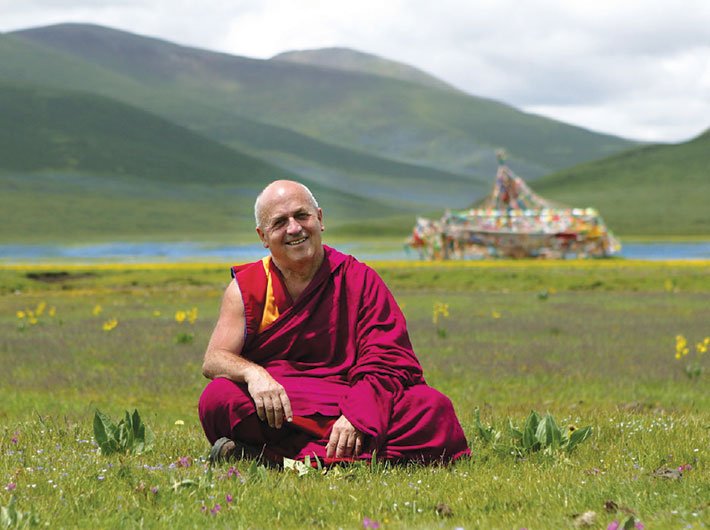Matthieu Ricard, 71, was dubbed the world’s happiest man after scientists carried out intensive research on him as he meditated. He is an author and holds a PhD in molecular genetics. Yet he gave up a promising career and became a Buddhist monk. An associate of the Tibetan spiritual leader, the Dalai Lama, Ricard now lives in a monastery in Nepal. In an email interview, the man with a warm, beatific smile reveals what it takes to be happy and more.
The ultimate goal of life, according the Dalai Lama and you, is happiness. How can we be happy?
From Greek philosopher Aristotle to the Dalai Lama, many great thinkers have said that happiness is the “goal of goals”. One pursues various goals in order to be happy, but happiness is a goal in itself.
Happiness cannot be achieved with just a few tricks. It is a skill that has to be cultivated and nurtured. One does not mind spending time to learn how to write, to read, or to gain a professional skill, and one easily understands why these require some effort. So how could one hope that altruism, compassion and happiness would just be born in our mind just because one wishes this to be so? So, one should identify which are the inner qualities and outer behaviour that lead to one’s happiness and that of others and cultivate those qualities. One should, at the same time, gradually phase out the states of mind and activities that are detrimental to others’ and one’s own happiness: hatred, greed, obsession, jealousy, arrogance and inner confusion.
Is happiness relative? Or is it only a state of mind? With so much sorrow and hardship in the world, is it possible to be happy?
Happiness is deep sense of flourishing that arises from an exceptionally healthy mind. This is not a mere pleasurable feeling, a fleeting emotion, or a mood, but an optimal state of mind. It comes with cultivating a cluster of skills that are also the most fundamental human qualities such as altruistic love, inner freedom, inner peace, resilience, and many other qualities that constitutes genuine happiness.
So, of course, there is no way to be satisfied when one sees so much suffering in the world. About 750 million are below the poverty line, there are millions who are displaced from their homes, who are orphans of war and victims of oppression and massacres. But, however sad the events and situations might be, it should actually increase our compassion, consideration for others, and determination to do something about it. Our humanitarian organisation, Karuna-Shechen, treats over 1,50,000 patients a year in India in Bihar and Jharkhand and benefits another 1,00,000 in Nepal every year. All these are key components to a meaningful life, therefore to a fulfilled life. In addition, the optimal state of mind related to genuine happiness gives one the inner resources to deal with the ups and down of life. So even in a very dramatic situation there are different ways to deal with it.
What is more important, other people’s happiness or our own?
We are one, they are numberless. So, of course, the happiness of many is more important that the happiness of a single person. Subjectively, we cannot but give foremost important to our own happiness since it reflects the way we experience our whole life, moment after moment. But I believe that this is a wrong debate, as altruism, having the intention and determination to accomplish the good of others, is a win-win situation, while selfishness is lose-lose situation. Let me explain this a bit. Seeking selfish happiness seems doomed to failure for several reasons. From the point of view of personal experience, thinking of me, me, me… all day long usually makes you feel miserable and you will also make everyone miserable around yourself. The second reason stems from the fact that selfishness rests on an erroneous postulate, according to which individuals are isolated, independent entities. The problem is that reality is quite otherwise and that our happiness can only be constructed with the help of others.
It is quite otherwise for altruism and compassion. On the level of lived experience, altruistic love is accompanied by a profound feeling of satisfaction. One could say that it is the most positive of all the positive emotions. What’s more, altruism is in harmony with the reality of what we are and what surrounds us, the fact that everything is basically interdependent.
In short, benefitting others is not only the most desirable of all activities, but also the best way to serve indirectly our own benefit. It is not a sacrifice, but leads to the two-fold benefit of others and us.
Isn’t happiness a goal for individuals to pursue? Can governments take upon themselves the task of creating happiness for people?
Governments cannot tell people how to be happy but they can provide the proper conditions and institutions that facilitate individual and societal well-being. These include democracy, freedom, social justice, respect of law and human right, diminishing inequalities, providing equal education and healthcare to all, irrespective of their social status, and promoting basic universal value that no one can reject – trust, honesty, benevolence, solidarity, cooperation, consideration for other human beings, animals and our environment, which will determine the fate of future generations.
Is it important for governments to promote meditation as a skill, and without the mumbo-jumbo – as a secular skill rather than as a religious discipline?
Since there is now much scientific evidence that training the mind in focused attention, emotional balance, altruism and pro-social behaviour leads to major benefit for young children and gives them skill to be a good human beings who contribute constructively to society, it is certainly advisable to include such intervention throughout the education system, starting right from pre-school. The ‘kindness curriculum’ developed by neuroscientist Richard Davidson in Madison, Wisconsin, in the USA, is one of many examples of successful intervention. In order to be applicable to all and widely accepted, this of course can only be done in a purely secular way. Secularism does not mean going against religion but being independent of religious beliefs.
We are in a rat race to achieve our personal and professional goals. Is this is also a way for some people to be happy?
As someone said, even if we win the rat race, we are still rats. This is indeed a bit of a rude statement, but one may understand it in a more gentle way. It really means that if our main goals are to be rich, powerful, physically attractive and forever young, we are in for a rough ride. We may even achieve a few of these goals, but all the studies in happiness research have shown that they contribute very little to genuine happiness. We should rather place more importance on friendship, qualities of human relations, kindness, cooperation, inner peace, being concerned by others rather than nagged by an exacerbated feeling of self-importance, being concerned by global issues such as the environment and inequalities, etc.
India ranks 122nd on the World Happiness Index. Some claim that India is ahead of the rest when it comes to compassion and meditation. Why, then, are we not so happy as a country?
It would be pretentious to offer an explanation, as I am not qualified to do so. But I guess that vast inequalities and the fact that so many millions are still deprived of basic health and education facilities while other accumulate vast wealth at the top are important factors contributing to people’s dissatisfaction. So again, we need more altruism, cooperation and solidarity.
(The interview appears in the May 31, 2017 issue)

